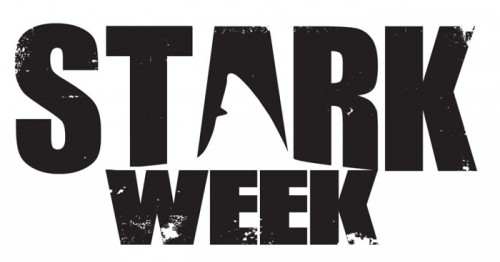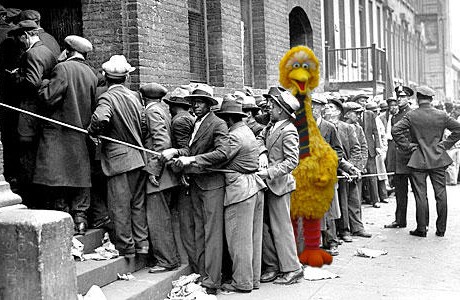STARK WEEK EPISODE #3: “The Reality of Moths” — John Cotter on City of Moths

Episode Three of STARK WEEK finds John Cotter flying around with the moths in City of Moths, the first section of King of the Forest, the first book of The First 4 Books of Sampson Starkweather. John begins with an excerpt from City of Moths:

There are constantly packs of wolves in the city wandering around abandoned monuments and subway stations without any sense of fear or resistance. As long as you mind your own business, they too will ignore you. But should some tourist acknowledge their existence or a young girl, sensing their animal presence, make a sharp movement, they will immediately swarm the victim…
What I love about this is the way the sentence beginning with “But” sounds like a translation from some forgotten surrealist poem. “But should some tourist” is suspiciously elegant but unusual. How often do you begin a sentence with “But should”? “Acknowledge” was probably more casual and familiar in the original. Was “young girl” joven or jeune fille? And was “animal presence” some kind of common phrase back then? Is that why they’d inject themselves with monkey glands?
I’m only half kidding. One of the pleasures of Starkweather’s poetry is the way he can seemingly discover original lines by Lorca or Apollinaire by writing them into existence. Jack Spicer, one of Starkweather’s heroes, could do the same.
And like Spicer, Starkweather uses the numinous to negotiate the real, as late in City of Moths, where he writes “The IRS is after me again. I mailed them Lorca’s ‘The Ballad of Weeping’ with my W-2.” That’s a beautiful idea, but we’re caught up short when we realize the title of “Casida Del Llanto” has only been published once in English as “The Ballad of Weeping” (usually it’s “The Weeping” or “Song of Lamentation”), and that was by Spicer, who famously took liberties with the texts. So was that a Lorca poem in the envelope at all?
This idea that mailing a poem to the IRS would matter is at the heart of what The First Four Books are saying. “The problem with fiction,” he writes in Self Help Poems, is that it “is predicated on the idea that there is a real.” Poetry, on the other hand, “has no pretensions of being real, it doesn’t care if you believe, it doesn’t even believe in itself.”
 But these lines don’t believe in themselves. Or do they? When Obama is elected, the poet is astounded because “it had nothing to do with politics or humanity or any of that shit, it was simply the fact that language did this.” Hope is the last word in the book, books. On the other hand:
But these lines don’t believe in themselves. Or do they? When Obama is elected, the poet is astounded because “it had nothing to do with politics or humanity or any of that shit, it was simply the fact that language did this.” Hope is the last word in the book, books. On the other hand:
I want to say what Nicanor Parra says after every reading: I take it all back.
Let’s propose for a moment that we can’t read without creating some kind of narrative (we can move our eyes over the words without creating a story, but that’s not reading, it’s scanning). So, to test this hypothesis, can we locate a story inside City of Moths?
If all of Starkweather’s poems are either epistles or apostrophes, Moths is both. The poems could easily be read as a series of letters to a former lover, letters never sent. “Okay,” the poet tells us early on, “for the sake of full disclosure, I’m afraid a woman has split my heart like firewood.” Their division isn’t the only cause of agony (or pleasure) in the book, but it’s profound. “Do you still live in the city we made?” he writes her. “You are a genius for leaving me.” And so the wolves in that opening passage are both the torments of the poet (could they tear him apart, as they did the girl) and the poet himself (he tore her apart). The surrealist pastiche becomes a way to rephrase loss. It’s also a method of wishing it away (“Hell is merely a series of images you can’t shake”). And it’s a needed distraction. And it’s all there is.
“I believe in scarecrows,” he writes, “They’re more convincing than people and much less frightening.” When he looks at them he thinks the word fire, the word Pascal sewed into his pocket against “the eternal silence of those infinite spaces.” Starkweather is the scarecrow and the king of scarecrows. He’s scared a woman away. He goes alone to the woods.
You can have your fucking city back. Just writing that feels like confessing a sin. Do you ever feel that guilt is our religion? I used to tell my mom, “My religion is that I love you.” Foolish boy, king of straw. Don’t tell anyone, but some of the scarecrows made a mistake and were real.
John Cotter is a founding editor at Open Letters Monthly. His novel Under the Small Lights is published by Miami University Press.
July 16th, 2013 / 2:19 pm
Alexandra Petri and John Deming Should Probably Get Married Because They Have A Lot In Common Because They Are Both Considerably Misinformed About Poetry
I intentionally missed most of the inauguration of Bruce Springsteen’s boyfriend. Symbols of democracy and freedom make my tummy quite queasy. I prefer the enchantment of The Little Mermaid to the mediocrity of the middle class and the person that they pick to govern them. But a couple of days after The Boss’s “partner” was publicly sworn in, I overheard two princess friends of mine discussing a poetry quarrel that arose from this inauguration. Supposedly a poet named Richard (I’m not sure of his last name, and considering his connection to Obama, he’s certainly not talented enough to Google or even Bing) read. The poem prompted a girl Washington Post blogger, Alexandra Petri, to declare that poetry is probably dead. A poetry boy, John Deming, quickly rendered a rebuttal. After reading both, I’ve come to the conclusion that each has a very un-magical, unsupportable viewpoint on poetry.
To begin, I’d like to declare that being “dead” isn’t deplorable: it’s delightful. Sylvia adored the dead. She covered herself in concentration camp victims. Her skin was “bright as Nazi lampshade.” Was Sylvia disempowered or on the margins of culture? No way, progressive gays! Sylvia was a spitfire. She slashed her daddy and her canonized poet husband. Charles Baudelaire, one of the best boy poets ever, sought the dead too. In “Spleen (ii)” Charles boasts that his skull holds “more corpses than a common grave.” Identification with dead doesn’t disadvantage Charles either. He’s a dandy — someone superlatively superior to humans, a boy who follows his own special set of laws. The dead are special and unique. They’re much more powerful than humans. To call someone or something dead is a term of incredible endearment, and should be embraced.
Ann Romney Should Be the Next President
Neither Mitt Romney nor Barack Obama is fit to be the president of the United States of America.
At first, my Tumblr literary corporation championed Mitt. We believed that he would cut taxes for the most moneyed Americans, thereby making it a breeze for a boy to snag a handsome millionaire so that the handsome millionaire would provide the boy with a weekly allowance that would cover straight-to-DVD Disney sequels, Snickers ice cream, and other such terrific trinkets and trucks. But, suddenly, Mitt started saying that he wouldn’t cut taxes for millionaires. Indeed, Mitt has become a centrist. Even if Mitt’s migration to the middle is merely a lie, it’s still revolting enough for my literary corporation to withdraw its support because compromise is so awfully common (not to mention unexciting).
Now, obviously, Barack Obama could never ever earn the endorsement of my Tumblr literary corporation. Obama’s trademark word is “hope.” Any thoughtful boy (or girl) knows that while there is “hope,” that “hope” cannot be realized on earth because “hope” has to do with heaven, which isn’t on earth. Baudelaire concurs. In the first Fleurs de mal poem, Baudelaire sings fondly about being an angel in heaven. Then, in the final “Spleen” poem in Fleurs de mal (which takes place on earth) hope is conquered by anguish. Yes, being amongst postlapsarian people is tediously tiring. Yet these fallen fartsniffers are the very ones that Obama plans to assist. Obama is the antithesis of Baudelaire. Obama is calm, nice, and pragmatic. Baudelaire is catty, hyperbolic, and pretty (he spent no fewer than two hours preparing his outfit for the day). Baudelaire is a performance. Obama is a person, which is the worst thing that anyone can ever be.
The Internet Political Magazine Blog of the Future
David Fishkind recently asked “Are You Afraid of Politics?“, and a lot of people, myself included, chimed in. Since then I’ve realized I have much more to say on the subject.
I normally don’t think of politics in Democrat/Republican/presidential election terms. I’m registered as an independent, and I prefer to live my politics on a daily basis—which is why I don’t drive, buy organic food when I can, and support local businesses run by people I know, etc. But it would be damn foolish of me to not recognize that “the political is personal” (to invert a phrase), and that the gentle people elected to the state and federal levels regularly impact both my daily life and my career as a writer. Specifically:
Four Outfits for Mitt Romney
 The Mitt Romney campaign is in a terrible tailspin. He trails Barack Obama in almost all major polls. The poor little Mormon actually has to stop attending fundraisers so that he can be out on the campaign trail more (and, even when he’s out and about, Romney proves to be so unentertaining that he must stump with more exciting Republicans). Then there’s the 47 percent comment. Mitt, honey, if you want people to like you, you shouldn’t call them losers.
The Mitt Romney campaign is in a terrible tailspin. He trails Barack Obama in almost all major polls. The poor little Mormon actually has to stop attending fundraisers so that he can be out on the campaign trail more (and, even when he’s out and about, Romney proves to be so unentertaining that he must stump with more exciting Republicans). Then there’s the 47 percent comment. Mitt, honey, if you want people to like you, you shouldn’t call them losers.
But tomorrow’s debate brings hope (to use Obama’s word). What can Romney say in the debate that will swing the momentum in his direction? Need Romney say anything? Can Romney convey a stronger message using only his clothes? Obviously. Here’s four outfits from Paris Fashion Week that Romney should wear in order to regain the upper hand.
Artistic expression is impossible under Barack Obama

This arrived in my email inbox this morning from a contributor who has asked to remain anonymous. I feel like posting it, so I will:
See what was happening was
See people were going to have the best hamburger yet, Puff Daddy had been sighted at the Anne’s Snack Shop in Pittsburgh for a ghetto burger
Dogs were having fun
See what was happening was there were no stop signs in any of the apartment complexes where anyone had grown up
Barack Obama brought the meat
Every morning in his cells, Bret Easton Ellis stands up and looks at the wall for 100 minutes before beginning on the sentences that will be deleted from his next novel
Someone is ready for hungry time
Today someone is ready for hungry time
When I say that ‘Artistic expression is impossible under Barack Obama’ I’m not any way trying to be funny
Though it will be easy to say I am
The best advice I ever got on writing was when the small woman full of blue blood stopped me in the street and asked me if I could help her tie her shoe
Which never happened
But was still the best advice I ever got on writing
People are getting afraid more often now, while eating waffles
At 4:04 am on 19th street in downtown Hemmings, a small child wriggles his fists in anticipation of the museum that will be built in the next 2-18 years over the ground where the room where he was going to one day cheat on his wife once stood
Today Barack Obama gets up in the morning and goes to the kitchen for a ham sandwich
But there is no longer any ham
There is an autographed replica of the first woman ever to be eaten alive, and there is a pack of Starburst gummies, and there is a lariat
But no ham
Happy New Year

2008 has been a historic year: We elected our first black president. Htmlgiant was born. I continued surfing porn naked.
If there’s anything these things have in common, it’s this: there’s a part of me that feels really good. Happy new year everyone.
Day of Jubilee: Tao Lin offers free victory book to Barack Obama

with ‘obama’ as president my writing will increase in viability, i believe
Happy Actually Having a Future Maybe, Instead of Definitely Being Totally Fucked!
Here’s one for the road-



